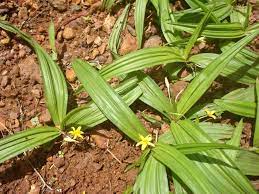BOTANICAL NAME: Curculigo orchioides
FAMILY: Amaryllidaceae
ENGLISH NAME: Black musli
COMMON NAME:
Hindi name: Kalimusali
Punjabi name: Syahoomusali
Bengali name: Sadamurali, Talamali, Talura
Kannada name: Neladali, Nelatenga, Nelatatigadde

REFERENCE: BHAVAPRAKASH SAMHITA with link e Nighantu:
https://niimh.nic.in/ebooks/e-Nighantu/bhavaprakashanighantu/?mod=read
HABITAT: Herb
BOTANICAL DESCRIPTION:
Drug occurs in transversely cut pieces of 2.5 to 5 cm long, cylindrical, straight to slightly curved, cut surface 1.0 to 4.5 cm in dia.; external surface blackish-brown, cut surface cream colored; surface with numerous shallow wrinkles and transverse cracks; with a few rootlets and root scars; nodes and internodes prominent; taste, mucilaginous and slightly bitter.
AYURVEDIC CHARACTERISTICS:
| RASA | GUNA | VEERYA | VIPAKA | PRABHAVA | DOSHGHNTA |
| Madhura, Tikta | Guru, Picchila | Ushna | Madhura | Pittahara, Rasayana, Balaprada |
AYURVEDIC ENERGETICS:
| TASTE | PROPERTY | POTENCY | POST DIGESTIVE EFFECT | EFFECT ACTION | DOSHA ACTION |
| Sweet, bitter | Heavy, sticky | Heating | Sweet | Pittahara, rejuvenate, strength promoting |
MAJOR CHEMICAL CONSTITUENTS: calcium oxalate Tannin, Resin
THERAPEUTIC USES:
- Mutraghata: Decoction of Talamuli will be useful
- Vajikarana: Krishna musali is mixed with ghee and used regularly.
INDICATIONS:
Arshapiles, Kasa cough, Klaibya Impotency
USEFUL PART: panchanga
DOSAGE: 3-6 gm of the drug in powder form
AYURVEDIC FORMULATION:
Musalyadi churna
